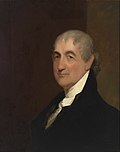| |||||||||||||||||
| |||||||||||||||||
 County results Strong: 50-60% 60–70% 70–80% 80–90% Varnum: 50–60% | |||||||||||||||||
| |||||||||||||||||
The 1813 Massachusetts gubernatorial election was held on April 5, 1813, in order to elect the Governor of Massachusetts. Incumbent Federalist Governor Caleb Strong won re-election against Democratic-Republican candidate and incumbent United States Senator from Massachusetts Joseph Bradley Varnum. [1]


